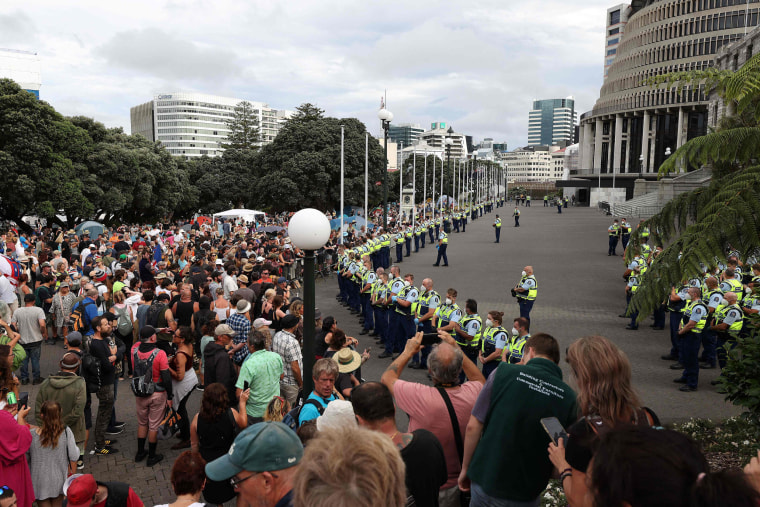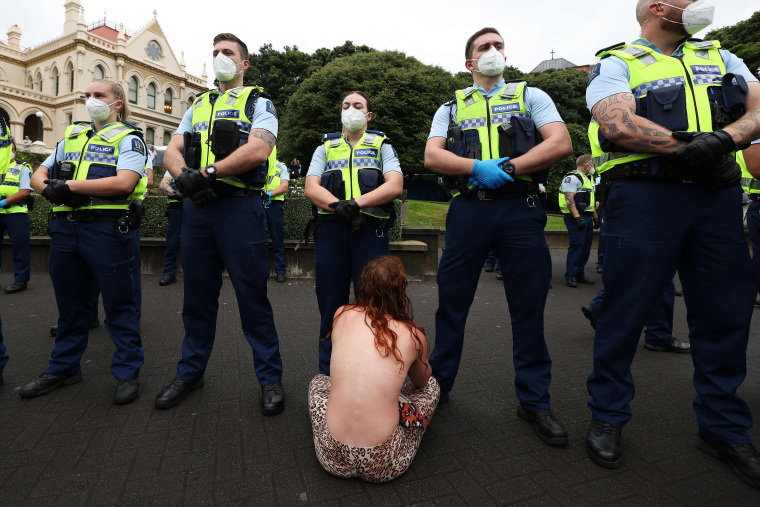Police in New Zealand's capital made more than 100 arrests as they moved to clear a protest camp outside the country's parliament where thousands had gathered to rally against Covid-19 restrictions.
Inspired by “freedom convoy” protests by truckers that have paralyzed the Canadian capital, Ottawa, since late January, demonstrators in Wellington have pitched tents and parked vehicles to block major roads surrounding the legislature since Tuesday.
The New Zealand protests are the latest sign of the truckers' growing influence beyond Canada's borders, as others mimic their strategies to oppose coronavirus laws in their own countries.

The arrests came after clashes between police and protesters as authorities looked to disperse the camp and avoid the kind of lengthy disruption that has hit Canada and now even threatened an economic hit for the United States.
“Around 120 people have now been arrested,” Wellington Police Superintendent Corrie Parnell said in a statement late Thursday afternoon.
“Parliament grounds were officially closed this morning however a number of protesters are still refusing repeated requests to leave the precinct... While many are protesting peacefully, others have attempted to breach the Police cordon,” he continued.
Arrested protesters face charges of trespass and obstruction.
"Wellingtonians have the right to conduct their lives and go about their business without the interference of ongoing unlawful activity," the New Zealand Police tweeted.
The force had earlier appealed to protesters to leave the area, while Prime Minister Jacinda Ardern urged the crowd to "move on," saying they did not represent the majority of the country. But many stayed put, with crowds of people and tents remaining outside the Parliament building into the evening.
New Zealand has enforced strict vaccine mandates for health, emergency and education workers. Two public polls conducted late last year showed over 70 percent of Kiwis supported the mandates, while about 94 percent of eligible people are vaccinated.
New Zealand has also maintained strict travel restrictions throughout the pandemic, leaving some citizens stranded abroad and separated from their families while keeping tourists out, too. The border restrictions are set to gradually lift starting later this month, according to a blueprint that stretches to October.
The country is experiencing a growing wave driven by the omicron variant, reporting a record daily high of 306 new community infections on Thursday. It has recorded a total of 18,460 coronavirus cases and 53 deaths since the pandemic began.

Demonstrations against Covid mandates are not new in New Zealand, where anger strict Covid-19 restrictions drew thousands of protesters onto the streets in November.
Neighboring Australia, which has maintained similarly strict measures throughout the pandemic, has also seen opposition to these restrictions develop into a burgeoning protest movement.
A demonstration dubbed the 'Australian Freedom Convoy' dragged into its 11th day in the capital, Canberra, where around a thousand protesters gathered to protest the country’s vaccine mandate. A mass rally has been planned for Saturday.
The country said on Monday it will reopen its borders to vaccinated travelers this month after nearly two years of closures that helped keep death and infection rates relatively low.